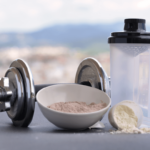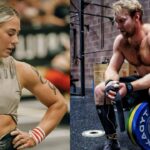As we journey past 40, our bodies start whispering (sometimes shouting) the need for extra care, particularly when it comes to fitness.
Discover how specific supplements can support your fitness journey post-40.
Learn how these supplements, alongside regular exercise, can help maintain muscle mass, reduce joint pain, and boost overall well-being.
Discover practical insights and scientific findings that make these supplements not just a choice, but a smart addition to your fitness regimen after 40.
Jump to:
1. Curcumin
Curcumin, the main phenolic compound found in turmeric, is increasingly recognized for its potential benefits in fitness, especially for individuals over 40.
One of the key advantages of curcumin supplementation is its powerful anti-inflammatory and antioxidant effects.
These properties are particularly beneficial in reducing inflammation and oxidative stress associated with intense physical activities. This reduction in inflammation and oxidative stress can lead to decreased pain and muscle damage, contributing to superior recovery and enhanced muscle performance.
Additionally, curcumin has been found to improve psychological and physiological responses during training, including thermal and cardiovascular responses.
Another benefit includes improved gastrointestinal function, which is crucial for overall health and fitness.
Scientific validation
A study found that curcumin had anti-inflammatory and antioxidant properties that are beneficial for older adults. It also aids in managing exercise-induced inflammation and muscle soreness, thus enhancing recovery and performance in active individuals (Hewlings & Kalman, 2017).
2. Collagen
Collagen is a protein that plays a crucial role in the structure of our body, particularly in connective tissues. As we age, collagen production decreases, which can impact skin elasticity, joint health, and overall body composition.
Supplementing with collagen peptides may help counteract these age-related changes, especially when combined with exercise.
Collagen supplementation has been found to improve joint functionality and reduce joint pain, which is particularly beneficial for individuals over 40 who may experience degenerative bone and joint disorders.
Additionally, it can positively influence body composition and strength, aiding in muscle recovery post-exercise. However, its impact on muscle protein synthesis is less significant compared to other high-quality protein sources.
Scientific validation
A systematic review published on PubMed analyzed 15 randomized controlled trials, focusing on the effects of collagen peptide supplementation in conjunction with exercise.
The studies included various populations, including recreational athletes, the elderly, and untrained pre-menopausal women.
The review concluded that collagen is most effective in improving joint health and reducing pain, with some benefits observed in body composition and muscle recovery.
This supports the supplementation of collagen for individuals over 40, particularly those active or experiencing joint issues.
3. Fish Oil
Fish oil is rich in omega-3 fatty acids, particularly EPA (eicosapentaenoic acid) and DHA (docosahexaenoic acid).
These fatty acids are known for their anti-inflammatory properties and are essential for maintaining heart health, brain function, and overall well-being.
As the body does not produce omega-3 fatty acids in significant amounts, supplementation through fish oil can be especially beneficial.
For individuals over 40, fish oil supplementation can offer several health benefits. It supports cardiovascular health by reducing triglyceride levels and may lower the risk of heart disease.
Fish oil also plays a role in maintaining cognitive function and has been linked to a reduced risk of age-related mental decline.
Additionally, its anti-inflammatory properties can help in managing joint pain and stiffness, which are common issues in this age group.
Scientific validation
Numerous studies have demonstrated the benefits of fish oil. A notable study published in the “Journal of the American College of Cardiology” found that fish oil supplementation leads to a significant reduction in cardiovascular events, especially in individuals with high triglyceride levels.
Another study highlighted in the “Journal of Neuroscience” reported that omega-3 fatty acids in fish oil are crucial for brain health and can slow cognitive decline in older adults. These findings underscore the importance of fish oil for individuals over 40, particularly for heart and brain health.
4. Creatine
Creatine is a compound that increases skeletal muscle creatine and phosphocreatine levels.
It is known for enhancing the performance of high-intensity exercise tasks by improving energy production in muscles.
This is especially relevant for older adults, as aging can lead to decreases in muscle creatine, muscle mass, bone density, and strength.
Creatine supplementation has been shown to be beneficial for older adults, including those over 40. It can increase body mass, enhance fatigue resistance, and increase muscle strength, thereby improving the performance of daily activities.
When combined with resistance training, creatine supplementation can further enhance these benefits, leading to increased lean body mass and greater improvement in activities of daily living. Additionally, it can contribute to an increase in bone mineral density when used alongside resistance training.
There is also evidence suggesting that creatine supplementation can improve cognitive function in older adults, particularly in those with impaired cognitive processing due to aging or sleep deprivation.
Scientific validation
A study published in “Journal of clinical medicine” highlights that creatine ingestion can reverse aging-related changes in muscle and bone, improving quality of life and potentially reducing the disease burden associated with sarcopenia and cognitive dysfunction.
This study emphasizes the substantial benefits creatine offers to older adults in both physical and cognitive aspects.
Moreover, a review from the Journal of the International Society of Sports Nutrition discusses how creatine supplementation can contribute to muscle performance and hypertrophy over time by increasing ATP and energy production during heavy exercise.
5. Protein
Protein supplements are commonly used to support muscle health, especially in older adults.
These supplements are important for maintaining and improving muscle mass, strength, and physical performance, particularly as natural protein synthesis rates decrease with age.
Protein supplementation can be particularly beneficial for individuals over 40. It helps in preserving and enhancing muscle mass, which is crucial for preventing sarcopenia—a common age-related condition.
Supplementing with protein, especially when combined with resistance training, can lead to improved muscle strength and physical performance. This is important for maintaining independence and quality of life in older adults.
Scientific validation
A systematic review published in “Sports Medicine” examined the effects of protein supplements on muscle mass, strength, and physical performance in healthy adults.
The review concluded that protein supplementation can enhance muscle mass and performance, especially when combined with an adequate training stimulus (like resistance training).
This is particularly relevant for untrained or older individuals, where protein supplementation can significantly contribute to muscle hypertrophy and strength gains.
6. Magnesium
Magnesium is an essential mineral involved in over 300 biochemical reactions in the body. It plays a key role in muscle and nerve function, blood sugar control, and blood pressure regulation.
Magnesium absorption decreases with age, making supplementation potentially beneficial for individuals over 40.
Magnesium supplementation can improve several aspects of health in older adults. It has been found to enhance sleep quality, an important factor for overall well-being and fitness.
Adequate magnesium levels are associated with better sleep efficiency, reduced insomnia severity, and decreased sleep onset latency.
Scientific validation
A double-blind, placebo-controlled clinical trial conducted on elderly subjects showed that magnesium supplementation resulted in significant improvements in sleep time, sleep efficiency, and reduced insomnia severity index scores.
This trial demonstrates the efficacy of magnesium in enhancing sleep quality in older individuals, which is crucial for maintaining health and fitness over 40.
7. Vitamin D & K
Vitamin D and K are important for bone and cardiovascular health.
Vitamin D is crucial for calcium absorption and bone health, while vitamin K is essential for blood clotting and may also play a role in bone metabolism.
Combining vitamin D with vitamin K has been shown to be beneficial for bone health.
The combination can significantly increase total bone mineral density (BMD) and decrease undercarboxylated osteocalcin, a marker related to bone quality.
Scientific validation
In a comprehensive study recently published in the journal “Sports Health“, researchers investigated the impact of vitamin D sufficiency on musculoskeletal health and athletic performance.
The study’s findings highlight a strong association between maintaining optimal vitamin D levels and improved muscle function. Elevated vitamin D levels were shown to have several beneficial effects, including reducing inflammation, alleviating pain, and enhancing muscle protein synthesis.
Moreover, athletes with higher vitamin D levels exhibited increased ATP concentration, greater strength, improved jump height, velocity, and power, along with enhanced exercise capacity and overall physical performance.
References
- Suhett, Lara Gomes et al. “Effects of curcumin supplementation on sport and physical exercise: a systematic review.” Critical reviews in food science and nutrition vol. 61,6 (2021): 946-958. doi:10.1080/10408398.2020.1749025
- Khatri, Mishti et al. “The effects of collagen peptide supplementation on body composition, collagen synthesis, and recovery from joint injury and exercise: a systematic review.” Amino acids vol. 53,10 (2021): 1493-1506. doi:10.1007/s00726-021-03072-x
- https://www.acc.org/Latest-in-Cardiology/Articles/2021/11/01/12/41/Fish-Intake-Fish-Oil-and-Cardiovascular-Health
- Dighriri, Ibrahim M et al. “Effects of Omega-3 Polyunsaturated Fatty Acids on Brain Functions: A Systematic Review.” Cureus vol. 14,10 e30091. 9 Oct. 2022, doi:10.7759/cureus.30091
- Candow, Darren G et al. “Effectiveness of Creatine Supplementation on Aging Muscle and Bone: Focus on Falls Prevention and Inflammation.” Journal of clinical medicine vol. 8,4 488. 11 Apr. 2019, doi:10.3390/jcm8040488
- Kreider, R.B., Kalman, D.S., Antonio, J. et al. International Society of Sports Nutrition position stand: safety and efficacy of creatine supplementation in exercise, sport, and medicine. J Int Soc Sports Nutr 14, 18 (2017). https://doi.org/10.1186/s12970-017-0173-z
- Pasiakos, Stefan M et al. “The effects of protein supplements on muscle mass, strength, and aerobic and anaerobic power in healthy adults: a systematic review.” Sports medicine (Auckland, N.Z.) vol. 45,1 (2015): 111-31. doi:10.1007/s40279-014-0242-2
- Abbasi, Behnood et al. “The effect of magnesium supplementation on primary insomnia in elderly: A double-blind placebo-controlled clinical trial.” Journal of research in medical sciences : the official journal of Isfahan University of Medical Sciences vol. 17,12 (2012): 1161-9.
- Shuler, Franklin D et al. “Sports health benefits of vitamin d.” Sports health vol. 4,6 (2012): 496-501. doi:10.1177/1941738112461621















